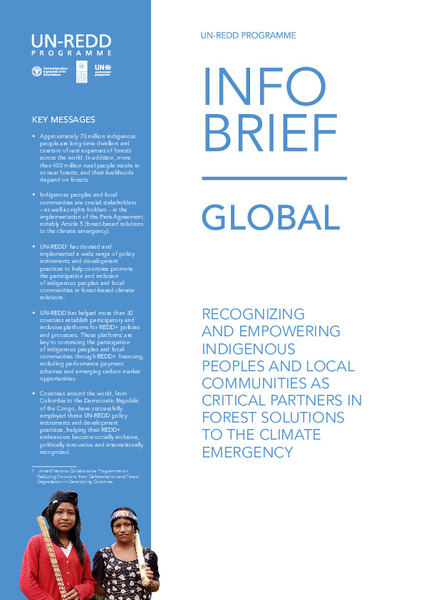Recognizing and Empowering Indigenous Peoples and Local Communities as Critical Partners in Forest Solutions to the Climate Emergency. UN-REDD Programme Info Brief Global

Date
2024-02Author
United Nations Environment Programme
Food and Agriculture Organization of the United Nations
Citation Tool
Bibliographic Managers
RT Generic T1 Recognizing and Empowering Indigenous Peoples and Local Communities as Critical Partners in Forest Solutions to the Climate Emergency. UN-REDD Programme Info Brief Global A1 United Nations Environment Programme, Food and Agriculture Organization of the United Nations YR 2024-02 LK https://wedocs.unep.org/20.500.11822/44919 PB AB TY - GEN T1 - Recognizing and Empowering Indigenous Peoples and Local Communities as Critical Partners in Forest Solutions to the Climate Emergency. UN-REDD Programme Info Brief Global AU - United Nations Environment Programme, Food and Agriculture Organization of the United Nations Y1 - 2024-02 UR - https://wedocs.unep.org/20.500.11822/44919 PB - AB - @misc{20.500.11822_44919 author = {United Nations Environment Programme, Food and Agriculture Organization of the United Nations}, title = {Recognizing and Empowering Indigenous Peoples and Local Communities as Critical Partners in Forest Solutions to the Climate Emergency. UN-REDD Programme Info Brief Global}, year = {2024-02}, abstract = {}, url = {https://wedocs.unep.org/20.500.11822/44919} } @misc{20.500.11822_44919 author = {United Nations Environment Programme, Food and Agriculture Organization of the United Nations}, title = {Recognizing and Empowering Indigenous Peoples and Local Communities as Critical Partners in Forest Solutions to the Climate Emergency. UN-REDD Programme Info Brief Global}, year = {2024-02}, abstract = {}, url = {https://wedocs.unep.org/20.500.11822/44919} } TY - GEN T1 - Recognizing and Empowering Indigenous Peoples and Local Communities as Critical Partners in Forest Solutions to the Climate Emergency. UN-REDD Programme Info Brief Global AU - United Nations Environment ProgrammeUnited Nations Environment Programme, Food and Agriculture Organization of the United Nations UR - https://wedocs.unep.org/20.500.11822/44919 PB - AB -View/Open
Item Statistics
Display item statisticsMetadata
Show full item recordDescription
Over the past decade, UN-REDD has developed and deployed a rich set of policies and practices to advance social inclusion and equity in REDD+ endeavours, with a focus on the rights of indigenous peoples and local communities and on gender equality. Since its inception in 2008, the Programme has supported inclusive, gender-responsible policy formulation and decisionmaking for national and subnational REDD+ processes. This approach is based on recognition of the fact that the women and men
who live within or in close proximity to forests and whose livelihoods depend directly on them, are not only the most affected by policy decisions regarding forest and land use, but are also the best positioned to protect and sustainably manage forests. The rights and knowledge of local communities and indigenous peoples deserve primary consideration. To underpin this approach, the Programme delivers technical support to REDD+ countries in three interrelated areas: social inclusion, gender equality and forest
tenure, governance and carbon rights.
Collections
Document Viewer
To read more, scroll down below.

